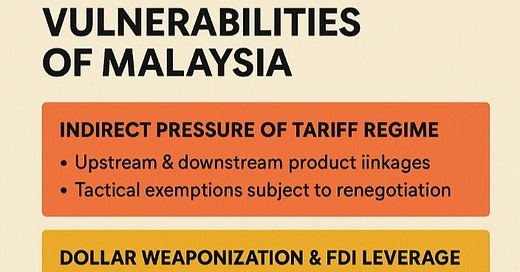With Donald Trump returning to the White House, two of Malaysia’s fastest-growing export pillars: semiconductors and pharmaceuticals are exempted as “strategic goods,” [¹] but the country is far from geopolitically safe or geoeconomically sustainable.
The reality is layered precariously.
Tariff Exemptions Are Tactical, Not Structural
The U.S. dollar isn’t just a currency—it’s a stick, wielded freely through the SWIFT system, financial compliance norms, and multinational capital controls.[²]
Malaysia’s financial markets, already exposed to speculative capital flows, are doubly vulnerable under Trumpian economic nationalism. His administration is likely to re-weaponize the U.S. dollar, using financial institutions, capital access, and reserve currency dominance as instruments of leverage. This leaves Bank Negara and EPF investment arms exposed to abrupt realignments in risk appetite.
This second Trump administration could:
Pressure global banks to slow investment into Southeast Asia under national security pretexts,
Trigger FDI volatility through executive orders, especially in U.S.-linked sectors like semiconductors, AI, and medical devices.
Malaysia's prized Intel US$7 Billion expansion, the burgeoning Kedah–Penang chip corridor, and digital pharma clusters may all become hostage to America’s broader Indo-Pacific power contest.
Caught in the Crossfire: Containing China via Malaysia
Trump’s worldview is zero-sum. To him, ASEAN is not a partner but a proxy arena. Malaysia — geographically and economically adjacent to China —could become a pressure valve for:
Restricting dual-use trade with Chinese firms (like Huawei, SMIC, ByteDance),
Curtailing tech exports that could feed Chinese military applications,
Forcing realignment on South China Sea diplomacy or Taiwan straits transit rights.[³]
The “chip exemption” does not mean Malaysia would not be told whom it can sell to — or penalized for failing to comply.
Trade Law Is Dead. Executive Fiat Reigns.
Trump’s first term has have shown how quickly Section 301, secondary sanctions, and IP enforcement directives can be activated on friendly nations.
Malaysia's proud FDI wins — Intel’s RM30 billion expansion in Penang, or U.S.-backed pharmaceutical hubs in Selangor — could become bargaining chips. Expect quiet back-channel ultimatums: open data flows, stricter IP controls, 5G vendor bans, or alignment on Taiwan and South China Sea policies— or risk slowdowns in investment disbursement.
Malaysia could also well be:
Accused of currency manipulation, based on MYR policy shifts,
Investigated for digital IP violations, especially if aligned with China’s software stack,
Targeted under digital trade controls if U.S. cloud providers are excluded from Malaysia’s data policies.
ASEAN Disunity as Leverage
Trump thrives on bilateral deals. ASEAN’s collective positioning is a liability to him.
We may have to expect, say:
Differentiated tariff leniencies to Vietnam and the Philippines (if more compliant),
Sanction threats or delays to Malaysia if seen as non-aligned or “too China-friendly,”
Fracturing of regional digital and energy cooperation due to American divide-and-rule geoeconomics.[⁴]
Conclusion: Preparing for the Post-Exemption World
Malaysia must not confuse “temporary exemption” with “strategic immunity.” The coming years may demand:
De-risking through supply chain independence,
Regional ASEAN integration that builds digital sovereignty,
A new non-aligned strategy that avoids entanglement between Chinese capital and American coecoercion. [⁵]
This is because in Trump’s trade world - even friends are pawns.
REFERENCES
1. USTR Office (2024). Strategic Goods Exception Policy – Semiconductor & Biotech Sectors.
2. Tooze, A. (2022). Shutdown: How Global Finance Rules the World. Allen Lane.
3. CSIS (2023). Chip Wars and Maritime Strategy: Southeast Asia as Proxy Terrain.
4. MITI Malaysia (2024). Position Paper on U.S. Indo-Pacific Trade Leverage Post-Biden.
5. STORM (2025). the-feasibility-and-viability-of-an-atlantic-pacific-sustainability-pact-in-the-context-of-existing-free-trade-areas.



